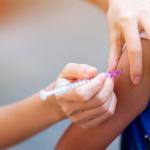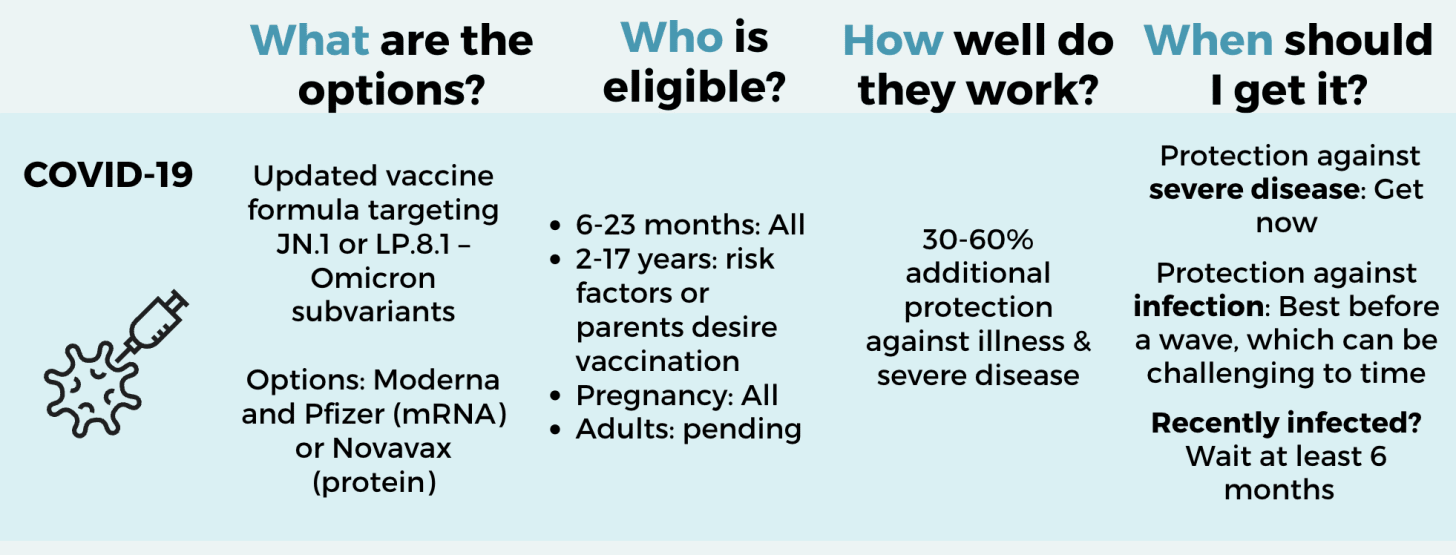A (Scientifically Based) Guide to Fall 2025 Vaccines

This fall, we have vaccines for three fall respiratory viruses: flu, RSV, and Covid-19. But keeping track of them isn’t easy. And for Covid-19 in particular, the federal process is in disarray, creating a rapidly shifting landscape that’s already affecting access. The good news: clarity is the antidote to confusion. So here are the what, who, and when for each, informed by the most up-to-date science and policy.
There are nuances to consider for those seeking maximum protection, but ultimately, the best vaccine is the one you receive.
Note: Don’t miss the three resources for you at the end of this email: a PDF summary (I know a lot of you are trusted messengers! Print this out and share), webinar registration, and a form for you to report if you’re having trouble finding or accessing vaccines.
Seasonal influenza (flu)
What: The vaccine covers three strains of seasonal flu and is offered by four pharmaceutical companies. Selecting vaccine strains for rapidly changing viruses, like flu or Covid-19, is both an art and a science, so the vaccine formula doesn’t always align perfectly with the circulating virus. But on average, flu vaccines reduce the risk of needing to go to the doctor by 30% to 60%.
The vaccines are all very similar, and you won’t gain much from shopping around. The nasal spray flu vaccine may work a bit better in children. A study suggested that the adjuvanted flu vaccine (Fluad) might work better in older adults.
Who: Everyone 6 months and older. Special formulations provide added protection for older adults. Children under 9 years old should receive two shots, one month apart, for their first flu vaccination.
When: Protection wanes throughout the season, so October is the best time to get vaccinated. The complete list of timing recommendations for specific populations (pregnant people, older adults, young children) is available here.
RSV vaccine for older adults
What: This season, there are three RSV vaccines: GSK, Pfizer, and Moderna. There are pros and cons to each:
-
GSK and Pfizer use traditional biotechnology (protein-based), which was available last year, so we have lots of “real world” data confirming safety and effectiveness. There is a small (but real) risk of Guillain-Barre syndrome—the risk is about the same as with flu vaccines.
-
Moderna’s is an mRNA vaccine expected to become available this season. It did not have a Guillain-Barre syndrome safety signal, but protection wanes more quickly.
Who: This is not an annual vaccine—if you got one before, you do not need one this year. Studies have shown that getting a second dose doesn’t meaningfully enhance protection so far. People ages 50 and older “may” get the vaccine. Those over 75 years “should.”
When: RSV vaccines show some initial waning in the first few weeks after vaccination but then stabilize at a high level of protection for more than one year, so getting one now should protect you throughout the entire season (and then some).
RSV vaccine for pregnancy
What: One vaccine is available: Pfizer’s ABRYSVO. Protection is passed from the mother to the baby so the baby is protected in the first 6 months of life, which is the riskiest time for severe RSV. Thousands of pregnant women got it last year, confirming the safety and high effectiveness (70-85%).
Who: During 32-36 weeks of pregnancy
When: September to January. This vaccine can be given simultaneously with other routine vaccines for pregnancy (Tdap, Covid-19, and flu). Some data show that getting an RSV vaccine at the same time as Tdap may reduce the antibody response to pertussis. So it may be worth considering getting the Tdap vaccine a few weeks before, but there is no formal recommendation.
RSV monoclonal antibody for infants
What: Monoclonal antibodies are not a vaccine (i.e., it doesn’t teach the body to make an immune response)—they are a preventive medication (providing antibodies directly and proactively). Last year’s real-world data showed that severe RSV in infants who received monoclonal antibodies was drastically reduced; one study achieved 90% effectiveness. This is a game changer for babies! This year, there are two options: nirsevimab or clesrovimab.
Who: All infants under 8 months should get it for their first RSV season, unless the mother received the RSV vaccine during pregnancy. High-risk children between 8 months to 19 months should also get it. If the mother got the RSV vaccine during pregnancy, getting a monoclonal antibody is not recommended unless the infant is at very high risk.
When: Generally, as close to RSV season as possible, which is typically between October and March. Protection holds up for at least 5 months.
Covid-19 vaccine
(Note: This is a rapidly evolving situation. I answered the top 12 questions last week. Go here for more details. Below is a more general overview.)
What: The fall Covid-19 vaccines have an updated formula targeting JN.1 or LP.8.1, which are Omicron subvariants. We don’t know their effectiveness in humans yet, but updated vaccines have consistently provided ~30-60% additional protection against urgent care visits or being hospitalized compared to people who didn’t get the vaccine in the fall. We lack comprehensive studies on the prevention of infection (or transmission), but previous studies estimate it to be around 20-30%.
Three vaccines are on the market:
-
Pfizer’s COMIRNATY Covid-19 vaccine for those 5 years and older
-
Moderna’s SPIKEVAX for those 6 months and older
-
Novavax’s NUVAXOVID for those 12 years and older
Who: Professional organizations recommend the following:
-
Kids: The American Academy of Pediatrics (AAP) recommends that all children under 2 years old get vaccinated, as well as high-risk children or those living with someone who is high-risk. Notably, the guidance includes permissive language that children not in the high-risk groups “whose parent or guardian desires their protection from Covid-19” should be offered a vaccine.
-
Pregnant women: The American College of Obstetricians and Gynecologists (ACOG) recommends that pregnant women receive the vaccine at any point during pregnancy, when planning to become pregnant, in the postpartum period, or while lactating.
-
Adults: The American College of Physicians (ACP) and the Infectious Diseases Society of America (IDSA) have yet to provide recommendations for adults and immunocompromised patients.
The FDA label has been restricted to individuals ages 65 and over and those between 6 months and 64 years old with at least one condition that puts them at high risk for severe outcomes from Covid-19. High risk includes pregnancy, those with diabetes, obesity, cancer, disabilities, or mental health conditions. By some estimates, that covers nearly three-quarters of U.S. adults. If you don’t fall into this category, you will have to request a vaccine “off-label.”
When: Due to federal disarray, some pharmacies have temporarily stopped giving the vaccine altogether. If this is your state, I’m hopeful this will be ironed out in a few weeks. Hang tight. Last night, I was on PBS NewsHour breaking down the situation.
If you’re able to get them, here is ideal timing:
-
If you were recently infected, wait 4-6 months. It doesn’t hurt if you get it earlier, but some research shows that waiting allows our antibody factories to update more effectively.
-
If you were not recently infected, the timing is a tough call. Either get it now—we are in the middle of a wave—or wait to increase protection against the winter wave (which may be closer to November).
Bottom line
Vaccines are one of the best things you can do this fall and winter to stay healthy and minimize disruption. As always, for specific questions or guidance, be sure to talk with your healthcare provider.
Love, YLE
Resources
-
If you have trouble finding a vaccine and want to share your story, fill out this YLE form. We can’t help you find a store, but we would like to hear your story and share it with others, if you’re comfortable with it.
-
For paid subscribers, we have two resources for you:
-
A webinar will be held on September 22 at 10am PT to provide more details and answer your questions on fall vaccines. Register below.
-
A PDF version of the fall vaccine summary. Feel free to download, print, distribute, or doodle on below! I will update if/when there are changes (looking at you, Covid-19).
-
-
Register for the webinar HERE entitled: All About Fall Vaccines. There are only 1,000 seats to reserve your spot now; we consistently hit capacity. And yes, this will be recorded and shared with paid subscribers afterwards.
-
PDF of Fall Vaccine options download below:
2025 Fall Vaccines PDF 67KB ∙ PDF file
Download
Your Local Epidemiologist (YLE) is founded and operated by Dr. Katelyn Jetelina, MPH PhD—an epidemiologist, wife, and mom of two little girls. Dr. Jetelina is also a senior scientific consultant to a number of non-profit organizations. YLE reaches over 340,000 people in over 132 countries with one goal: “Translate” the ever-evolving public health science so that people will be well-equipped to make evidence-based decisions. This newsletter is free to everyone, thanks to the generous support of fellow YLE community members. To support the effort, subscribe or upgrade.





